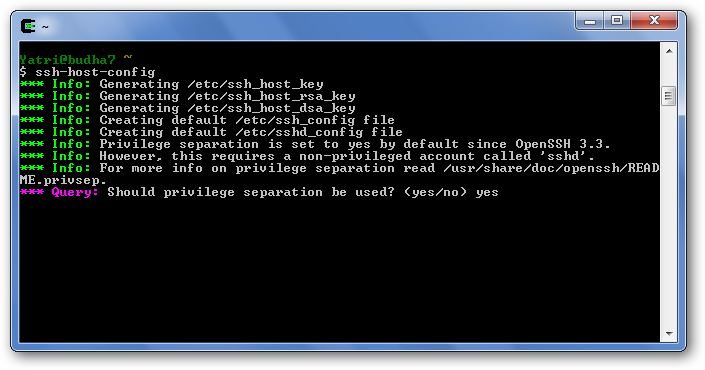

- SSH KEYGEN WINDOWS OPENSSH INSTALL
- SSH KEYGEN WINDOWS OPENSSH PORTABLE
- SSH KEYGEN WINDOWS OPENSSH PASSWORD
- SSH KEYGEN WINDOWS OPENSSH DOWNLOAD
- SSH KEYGEN WINDOWS OPENSSH FREE
SSH KEYGEN WINDOWS OPENSSH PASSWORD
If your private key has a passphrase fill the password in the “Password” field, otherwise keep it blank.įor our test, we are going to check off the following options, ensuring our SSH key is only available when our password vault is unlocked. The public key should now be displayed below if properly attached. Once attached, go to SSH Agent and select your private key from Attachment. Ssh-keygen.exe -t ed25519 -C " "īack in KeePassXC, Create a new vault entry and select Advanced.
SSH KEYGEN WINDOWS OPENSSH INSTALL
*If you Don’t have the OpenSSH Agent service, you may need to install it first. Look for “OpenSSH Authentication Agent” and set Startup type to Automatic and start the service. Use Search or the Run box to open Services.msc.

If you already use a KeePass derivative, open your existing vault. Setupĭownload the latest KeePassXC and install. You should treat this file with a 3-2-1 backup mentality.
SSH KEYGEN WINDOWS OPENSSH DOWNLOAD
Unlike cloud password managers if you lose this file (or access to download it) you are hosed. Great care should be put into protecting and backing up your KeePass database file. NEVER show or give your private keys to anyone. I will be generating new and disposable SSH keys for demonstration.
SSH KEYGEN WINDOWS OPENSSH PORTABLE
SSH KEYGEN WINDOWS OPENSSH FREE
Nothing against them, I still advocate for Bitwarden for anyone looking at a simple cloud and free password manager. I love the personal control I have over my vault, and when I started using it in 2012 most of the cloud password managers were not as strong as they are today. I’ve been using KeePass for almost a decade now. I wrote this guide with Windows 10/11 in mind, but should also work on Linux and MacOS OpenSSH agents. I’m going to talk about what I’ve done to solve this issue with security in mind, without disrupting my existing workflow and using the now native Windows OpenSSH service. Now you have become the digital equivalent of a building superintendent with massive ring of keys and no easy way to keep track of their usage.

It’s a lot easier to re-key 2 servers than 25.Įverything, we have compartmentalized our keys but now you have a new problem. Because of this, I choose to generate SSH keys for specific purposes or clients, thus limiting the “blast radius” a leaked key will have. There is a chance you will leak private keys (accidental GitHub commit, bad filesystem permissions, show it on a livestream, malware/trojans, and so on). While SSH keys offer greater security compared to passwords, they do not offer perfect security, no solution ever will (not even this one!). Many people will start using SSH keys having 1 key for their system, I was there myself. Over the years I have found myself becoming a collector of SSH keys used for different systems and clients of mine.


 0 kommentar(er)
0 kommentar(er)
